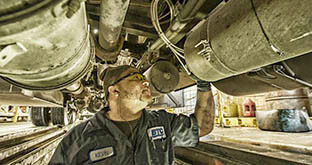Sr. Industry Business Advisor — J. J. Keller & Associates, Inc.
4 Benefits to Automating Preventive Maintenance Recordkeeping
Reduce manual efforts and improve operations by automating preventive maintenance.
Published On: 05/24/2019


Written by:
Tom Bray
The automation that comes with electronic vehicle inspection and maintenance solutions can prove invaluable in reducing your fleet’s manual effort and improving operational effectiveness. Featuring capabilities like electronic tracking and scheduling, maintenance notifications, secure access to vehicle information, calculated unit maintenance costs, customizable inspections, and easy reporting, the benefits of automated preventive maintenance recordkeeping could prove critical to your fleet’s compliance and bottom line.
1. Minimizing Safety Risks
A maintenance program that relies on reactionary methods not only results in unwanted down-time and costs of idle equipment, it poses a significant safety risk to the driver and surrounding motorists. Having automated tools in place to receive proactive notifications of issues and perform timely repairs, helps you avoid being cited for negligence that could have resulted in an avoidable injury or fatality.
2. Documented Proof
Perhaps one of the more obvious benefits of automated vehicle maintenance records is their ability to provide detailed and easily accessible proof of compliance with the FMCSRs, particularly in the event of an audit or crash investigation. In either of these cases, an official will determine the adequacy of your maintenance program based on frequency and quality of inspections, as well as the timeliness of defect resolution. Being able to demonstrate efficiency and compliance in these areas through systematic, electronic records is a first line of defense against unnecessary risk.
3. Reducing Costs
Every time a driver shuts down a vehicle due to a mechanical issue (whether the result of a breakdown or being placed out of service), a number of primary and variable costs start to add up:
- Cost of sending help
- Cost of repair at the roadside or as result of a “patch” job, which is typically more expensive than a repair performed by the carrier’s trusted shop or vendor
- Lost revenue from capacity loss
- Negative impact on customer service and relationship
- If repetitive, the negative impact on driver turnover
While expensive, these costs pale in comparison to your liability exposure if maintenance issues become a contributing factor in an accident. An automated preventive maintenance program provides timely communication of defects and deficiencies, reducing the odds that your fleet will experience any costly “surprise” mechanical issues.
Beyond avoiding the costs of potential repairs, focusing on preventive maintenance can reduce costs in another major way — prolonging the life of your vehicles.
4. Improving Your BASIC Score & Avoiding a DOT Audit
Year over year, there are more violations issued in the Vehicle Maintenance BASIC than all other BASICs combined, including over 60% of roadside inspection violations. With nearly a 1 in 5 statistical chance of being placed out of service due to a mechanical defect or cargo securement violation, it would be wise to examine your approach to vehicle maintenance and consider how automation might keep your scores in check, and as a result, make you less susceptible to an audit.
Automating Your Preventive Maintenance Reporting
By taking a proactive, purposeful approach to vehicle maintenance, you will have considerable control over your operation’s safety, bottom line, and reputation. Incorporating automation simplifies this process significantly by providing the tools to efficiently identify and resolve potential setbacks to your vehicles’ operation before they become a problem.
Automate your preventive maintenance tasks with J. J. Keller’s electronic DVIR solutions, available for both regulated and non-regulated fleets. Learn more here.
You may also enjoy the following articles:
Sign up for our newsletter!
We'll help you stay on top of regulations, best practices, and fleet industry news. Sign up to receive a monthly email notification with links to our most recent blog articles, free resources, and event invites.
